|
|
|
| Module code: AGW23.2 |
|
|
6V (6 hours per week, accumulated) |
|
9 |
| Semester: 1 |
| Duration: 2 semester |
| Mandatory course: yes |
Language of instruction:
German |
Assessment:
Exam achievement
[updated 17.04.2025]
|
AGW23.2 (P311-0267, P311-0268) Applied Health Sciences, Bachelor, ASPO 01.10.2023
, semester 1, mandatory course
|
90 class hours (= 67.5 clock hours) over a 15-week period.
The total student study time is 270 hours (equivalent to 9 ECTS credits).
There are therefore 202.5 hours available for class preparation and follow-up work and exam preparation.
|
Recommended prerequisites (modules):
None.
|
Recommended as prerequisite for:
AGW23.13
AGW23.14 Care Management and Evidence-Based Practice
AGW23.17
AGW23.18
AGW23.19
[updated 04.12.2025]
|
Module coordinator:
Prof. Dr. Dagmar Renaud |
Lecturer:
Prof. Dr. Dagmar Renaud
[updated 01.04.2025]
|
Learning outcomes:
23.2.1.: Fundamentals of General Psychology
Learning outcomes:
After successfully completing this module, students will:
be familiar with controlled and automatic processes of perception and attention
be able to describe systems and models for memory and the representation of knowledge
have basic knowledge regarding theories from the psychology of learning
understand that learning processes are crucial for changing behavior
be familiar with theories of emotional and motivational psychology
be able to describe the describe the attachment theory
be able to understand the effects of bonding experiences on behavior, experience and health
be able to apply selected learning theories to change health behavior
be able to promote motivation to change health behavior
be able to take individual requirements into account when changing behavior
be able to initiate learning processes
be able to recognize and react appropriately to the inappropriate handling of their own emotions by themselves and others
be able to understand and reflect on their own learning processes
be able to reflect on their own social-emotional competencies
be aware of their own emotional regulation skills
23.2.2.: Health Psychology
Learning outcomes:
After successfully completing this module, students will:
be familiar with the basic concepts, questions and research methods in health psychology
understand the connection between mental and physical processes in the context of psychosomatics
be able to describe the theories and concepts of stress and the concept of coping
be familiar with the current state of research on the relationship between personality and health
be able to engage with theories of health and illness behavior
understand the relationship between behavior and health
understand this connection as the basis for behavioral preventive measures
be able to apply health behavior models to fields of action in prevention and health promotion
be able to use their knowledge of the cognitive and emotional conditions of health behaviors to stimulate behavior change
be able to identify stress response patterns, risk factors and resources
be able to use their knowledge on resilience to understand prevention and health promotion across a persons lifespan
support the design of adequate psychosocial conditions for health promotion
be able to assess the individual health behavior of people and communicate accordingly
be able to present the current state of health psychology research in an understandable way
be able to convey the interrelationships of mental and physical processes
be able to reflect on their own health and illness behavior
be aware of their own stress experience or their own coping strategies
23.2.3 Fundamentals of Social and Neuropsychology
Learning outcomes:
After successfully completing this module, students will:
understand how people think, act and feel in social situations
be familiar with the processes of social information processing
be able to describe the basics of selected theories of social psychology
understand the interaction processes within groups
be aware of the conditions of prosocial behavior
understand the neural foundations of human experience and behavior
understand the connection between health and identity
be able to apply their knowledge of social information processing processes in understanding interpersonal interactions
be able to evaluate the influence of cognitive processes on how impressions are formed
be able to analyze the behavior in groups
be able to apply neuropsychological knowledge to understand disturbed brain functions
be able to use their knowledge of social interactions in their own professional communication and cooperations
be able to recognize automatic processes of information processing in social interactions
be able to communicate their knowledge of neuropsychological findings in a professionally appropriate manner
be able to shape professional relationships taking into account social psychological processes
be able to reflect knowledge about the self with regard to their own self-perception
[updated 17.04.2025]
|
Module content:
23.2.1.: Fundamentals of General Psychology
Introduction to psychology
Subject matter and issues of general psychology
Perception and attention
Memory systems and models
Representation of knowledge
Thinking
Theories of learning
Emotions and social-emotional skills
Emotion regulation
Motivation and volition
Attachment theory
23.2.2.: Health Psychology
Subject matter, basic concepts and issues in health psychology and psychosomatics
Health psychology research approaches and methods
Models of health and disease behavior and change
Theories of stress and the effects of stress on health (mind-body interaction)
Salutogenesis
Psychosocial conditions for health: resilience, resources and health behavior
Experience of illness, coping and dealing with (chronic) illness
Connection between health and personality
Selected fields of action in applied health psychology (e.g. consumption of psychoactive substances, eating disorders, physical activity)
23.2.3 Fundamentals of Social and Neuropsychology
Social perception, social cognition and heuristics
Attribution theory
The self
Cognitive dissonance theory
Attitudes and attitude changes
Prosocial behavior
Group processes
Neural plasticity
Neuropsychological references to selected clinical conditions
[updated 17.04.2025]
|
Teaching methods/Media:
Blended learning
[updated 16.11.2023]
|
Recommended or required reading:
Will be announced at the beginning of the module.
[updated 16.11.2023]
|

